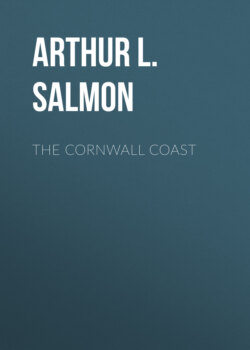Читать книгу The Cornwall Coast - Arthur L. Salmon - Страница 5
На сайте Литреса книга снята с продажи.
CHAPTER II
ОглавлениеTable of Contents
LOOE AND POLPERRO
As we pass along the coast from Whitesand Bay towards Looe we are approaching a spot that is now prized for its exceeding loveliness, but that formerly took high rank among the seaports of the West Country. In appearance and in ancient position it must be classed with Dartmouth and Fowey, which both were likewise notable ports in days when the English navy was in its sturdy infancy—days when the national pulse beat most keenly in the south and east instead of in the north and midlands. Commerce and industrialism have largely changed all that; Liverpool, Manchester, Birmingham have assumed metropolitan importance in their densely populated districts. Only Plymouth in the south-west is now of first-class consequence to the nation; and Plymouth is a parvenu compared with Looe and Fowey. The actual decline of these two little towns may not be great, but relatively it is enormous. Yet it deserves a milder term than decay, for the present-day life here is still wholesome and in a certain sense prosperous. It is a gentle and placid prosperity, very largely the happiness of places that have no history. There is the compensation of a glorious past, and there is the further compensation that such places preserve for us the best picture of what Old England truly was in days before she became "a nation of shopkeepers." It is no use to go to the flourishing commercial cities to find traces of earlier England; these cities have usually swept away the traces of antiquity they once possessed—tortuous streets are straightened and widened, quaint old houses are thrown down, the picturesque makes way for the useful; even the old churches are looked at askance, as occupying ground that might be devoted to warehouses and offices. In these quiet corners of the West such temptations have not presented themselves; population is thin, and there is little call for the destructiveness of expansion; mediævalism may still be found here, in the streets and byways, in the houses, and sometimes in the people. The chief peril is in the intrusion of the summer holiday and the "week-end." Irreparable damage is sometimes prompted by the desire to attract visitors. But those who come to the West Country are not usually such as seek for the noise and glare of the conventional watering-place. They come for natural beauty, pure air, and quietude. The recreative pleasure that they crave must be of a different kind from that with which they can daily become familiar if they please. There are theatres and music-halls in town; it does not add to the wittiness of the Pierrot or the humour of the comic singer to find them exercising their functions on a hot dusty beach, densely packed with humanity, strewn with torn newspapers, burnt matches, orange skins, and banana peelings. Yet those who feel in this manner are a minority, otherwise certain popular resorts would be less flourishing.
The crowds that flock to the average watering-place may leave their toils behind them, but they apparently wish to carry their amusements. Even the jaded mill-hand asks for the congested variety entertainments of Blackpool or of Douglas, rather than for the solitudes of shore and woodland. In moments of pessimism one may fear that the very capacity of peaceful enjoyment is being killed, and that ceaseless grinding work destroys the power of resting. When the ordinary tourist visits places of peaceful solitariness he usually does so in crowds that rifle and ravish the sacredness of this solitude; he ruthlessly desecrates that which he does not understand; he never learns its secrets; the most commonplace of public parks would have responded fully to his needs and their gratification. But the West has long been a resort of that wiser, certainly better endowed, minority that seeks for direct personal contact with Nature, face to face, and not merely as seen through the glass windows of huge pavilions or from the seats of fashion-haunted promenades. Therefore the majority of Western watering-places are not yet spoiled; their physical features have often assisted to preserve them. They have not lost the quaint simplicity of their parochialism, to become national if not cosmopolitan. Constant intercourse with even the most sober of visitors must take something from the provincialism, the cherished traditions and local customs, the personal peculiarities and dialect. But there is still a good deal left; there is still the possibility of reaching Nature in her inmost sanctuaries, and at the same time winning some of those elusive and shy confidences that are the charm of locality.
